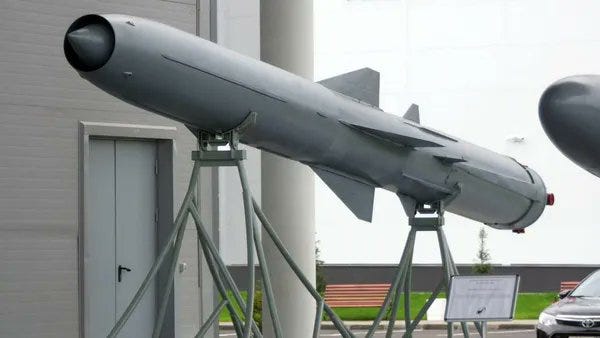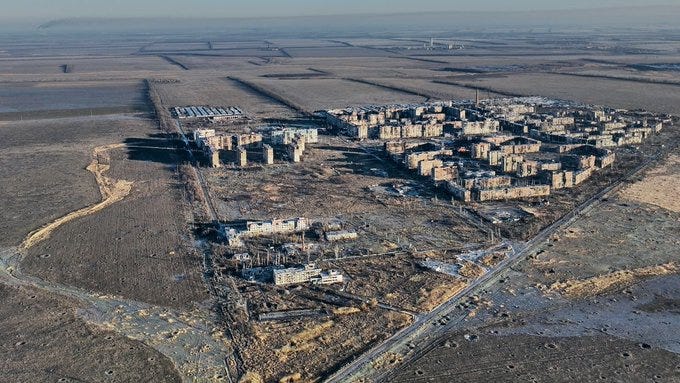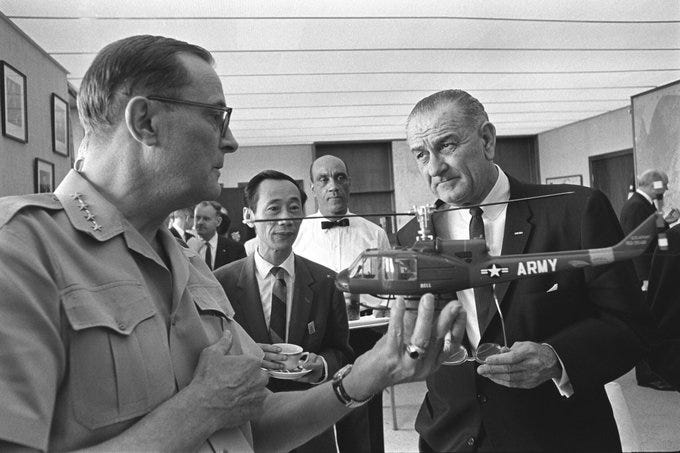I guess this would have to be the big geopolitical and war story for today—unless you’re one of those people who thinks Putin never does anything but bluff:
Zlatti71 @Zlatti_71
 Vladimir Putin held his first public meeting of the standing conference of the Russian Security Council on nuclear deterrence.
Putin's opening remarks at the meeting of the Security Council's standing conference on nuclear deterrence:
"It has been proposed to introduce a number of clarifications in terms of defining the conditions for the use of nuclear weapons. Thus, the draft Fundamentals expands the category of states and military alliances in relation to which nuclear deterrence is carried out. The list of military threats, for the neutralization of which nuclear deterrence measures are carried out, has been supplemented. What else I would especially like to draw your attention to is that in the updated version of the document, aggression against Russia by any non-nuclear state, but with the participation or support of a nuclear state, is proposed to be considered as their joint attack on the Russian Federation," Putin said.
- FRWL
12:23 PM · Sep 25, 2024
Hmmm.
Today I’ve been listening to Doug Macgregor (with Danny Davis, great interview) and Larry Wilkerson (with Nima). A common theme is that the US military is simply unprepared for any major war. Between Ukraine, Israel, and Yemen our supplies—especially of all air defense missiles—has been greatly depleted. Vladimir Putin is once again considering supplying Yemen with capable anti-ship missiles. Given that US power projection in the Middle East begins with the USN, that could be a game changer.
BREAKING:
Russia is negotiating with Yemen's Houthis via Iran on the transfer of long-range anti-ship missiles P-800 "Onyx" to them, Reuters reports, citing sources. No decision has been made on the transfer yet, and new meetings are planned in Tehran in the coming weeks. Houthis attack Western commercial and military ships in the Red Sea. Let us recall that in June Putin stated that if Western countries allow Ukraine to strike at the Russian Federation, Russia could supply its long-range weapons to the forces that would strike at those Western countries that gave such permission.
A few points. First, while the original threat by Putin was directed at the Western threat of long range missile strikes into Russia, there’s nothing to say that Putin’s rationale couldn’t expand, now that the Anglo-Zionists are ramping up a regional war in the Middle East. The current export “Yakhont” version of this missile has a range of about 75-186 miles, but other versions have ranges up to 500 miles. The speed is Mach 2.9 (1998 mph), and the terminal approach to target altitude is a sea skimming 32 ft. There’s some notion that electronic counter measures could work against it, but it would only take one hit from this missile to seriously ruin your day. Here’s how Will Schryver frames that concept:
The US Navy has recently discovered that it's not easy to operate in a "war zone" — or even any zone where there is a remote but credible possibility of someone shooting at them.
This comes at a time when USN mobility in the region is seriously compromised by the disastrous mishap with the oiler that was servicing the USS Abe’s carrier strike group (we mentioned this yesterday):
Armchair Warlord @ArmchairW
A commercial tanker that can service a carrier group in a war zone?
Oil tankers can certainly do transfers at sea but that's not underway replenishment by any means... and they'd really need a product tanker to carry the jet fuel modern gas-turbine warships use.
I'm speechless.
Quote
John Ʌ Konrad V @johnkonrad
Sep 24
It’s not looking good. I’ve been told by a shipowner the Navy does not have a spare oiler to deploy and is scrambling to find a commercial oil tanker to refuel the Abraham Lincoln carrier group.
Updates over at gCaptain forum: https://forum.gcaptain.com/t/usns-big-horn-incident/70744?u=john…
0:00
11:39 PM · Sep 24, 2024
The fortress town of Ugledar is the linchpin connecting the Donbas and Zaporzhye defensive lines for Ukraine. It also was a constant threat to communication lines running to Crimea. Note in the aerial photo of Ugledar that those high rise buildings were extensively prepared over years to serve as fortresses, along with the mines and related buildings. Losing Ugledar is a big deal:
Mikael Valtersson @MikaelValterss1
The photo of Ugledar is very good and gives a good overview of the entire settlement. In the background you see both the mine and how open the terrain is to the north. It will be hard to retreat in that terrain.
Quote
Mikael Valtersson @MikaelValterss1
NEWS ANALYSIS: BOGOYAVLENKA CAN'T REPLACE UGLEDAR, SEP 25th 2024 In a Forbes article today, David Axe talks with several Ukrainian war analysts and according to them UkrAF has begun a quiet withdrawal from Ugledar (Vuhledar).
The 72nd Ombr/Brigade defending Ugledar has around 2000 experienced soldiers and it's destruction or depletion would significantly reduce Ukrainian resistance in the southeast.
In the article there's a hope that the settlement Bogoyavlenka shall be able to replace Ugledar as the cornerstone of Ukrainian resistance in the southeast.
This is not possible. Ugledar was a real fortress; high sturdy apartment blocks situated on a hill overlooking open fields in the low ground. After 31 months of fighting Ugledar and its surroundings were also well fortified.
Bogoyavlenka isn't fortified, situated on low ground and has only small residential buildings. It's impossible for the remnants of the 72nd Ombr to defend Bogoyavlenka for more than a couple of days.
Ugledar was (is) very important for Ukrainian defence and its fall will have a great impact on the fighting in the southeast.
Finally we go all the way around the world to the Far East. There’s a very interesting article out about war gaming a conflict with China. War gaming has its uses, especially in hindsight. War gaming told us not to get involved in Vietnam in a big way. Now it’s flashing the same advice re China. Well, Doug Macgregor has been ranting the same advice for a long time, and he does again in the video I referenced above. What’s interesting in what I’m going to present is that this piece about war gaming China is linked by Elbridge Colby, who has—until now—made his name as a China Hawk (Thinking About China). He’s been angling for a high NatSec position in any new Trump administration. Has he become a born again foreign policy Realist? Or is he simply advocating cutting and running from Taiwan back to, say, the Philippines?
If we know our strategy isn't going to work and be very costly, then we shouldn't pursue it. We should tear off the bandaid and do something different, even if it involves lesser goals and sharp change. Relevant to Ukraine and, on current trends, Taiwan.
The Wargames That Prophesized America’s Defeat in Vietnam - War on the Rocks
Here are the first three paragraphs. Note the dates—two years before the Gulf of Tonkin.
It is the early 1960s and America stands at a crossroads in Southeast Asia. President Lyndon B. Johnson is in the midst of a re-election campaign while attempting to grapple with an escalating situation in Vietnam. The South Vietnamese government appears increasingly weak and unstable as the Viet Cong are increasing the tempo of their attacks. As the president weighs his options, many of his top advisers convene in classified rooms in the bowels of the Pentagon basement to play a series of wargames. These were the Sigma Wargames — a series of political-military simulations played from 1962 to 1967. Featuring prominent figures such as National Security Advisor McGeorge Bundy, Chairman of the Joint Chiefs of Staff Earle Wheeler, and Gen. Curtis LeMay, the Sigma Wargames explored potential scenarios for America’s deepening involvement in Southeast Asia. Could the United States bomb the Viet Cong into submission? Could the United States contain the ground war and minimize its own troop losses? Could the United States keep a war in Southeast Asia from escalating?
The games’ answer to these questions was no. No, the United States could not win the war with strategic bombing alone. No, the United States could not fight and win a limited war. And no, the United States would not be able to control how the conflict escalated in Southeast Asia. Over and over again — despite changes in scenario, game rules, and players — the wargame series predicted that U.S. strategic bombing campaigns in Vietnam would lead to a costly quagmire with severe domestic and international political repercussions.
Despite the remarkably prescient and consistent findings, there is little evidence that the wargame series changed key American decisions about Vietnam. Why? And what can these games that didn’t define Washington’s choices in Vietnam teach us about a simmering crisis with China?
About the current war gaming of China:
Recent wargames run by think tanks like the Center for a New American Security and the Center for Strategic and International Studies on a Taiwan conflict bare similar warnings for U.S. decision-makers as those foreshadowed by the Sigma games. Like Vietnam, today’s games find that a war with China will be costly, bloody, and difficult to control, a conflict that promises to deplete already waning U.S. munitions stockpiles and test an uneasy stability between two nuclear-armed countries. And, like the Vietnam games, these China games feature prominent U.S. players: congressional members, former under-secretaries, and four-star generals.
We know from Larry Wilkerson that 20 years after the Sigma war games the US military war gamed Iran. Big red flashing lights: Do not do this, don’t even think about it. The inadvisability of launching into a full war on Iran has only increased since the 1980s, but our “allies” in Israel and in its Lobby in America are eager to have the US try it. What other Middle East war games have been conducted since then? Lebanon? Yemen?





https://m.youtube.com/watch?v=THKnCTv53BI
From the peanut gallery, it looks like Five eyes is Six eyes, and we are being worn like a skin suit.